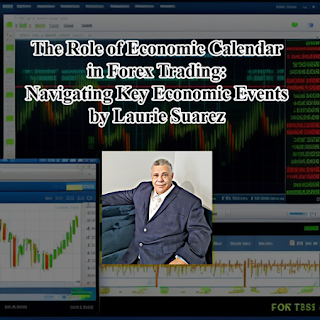The Role of Economic Calendar in Forex Trading: Navigating Key Economic Events by Laurie Suarez (www.lauriesuarez.blog)
Introduction:
Forex trading involves
buying and selling currencies in the foreign exchange market to profit from
fluctuations in exchange rates. However, the forex market is highly influenced
by economic events and news releases that impact currency valuations. To stay
ahead in the forex market, traders rely on an essential tool known as the
economic calendar. In this blog, we will explore the role of an economic
calendar in forex trading and how it helps traders navigate key economic
events.
- What is an
Economic Calendar?
An economic calendar
is a tool that provides a schedule of upcoming economic events, such as central
bank meetings, economic indicators releases, and important announcements. It
includes events like interest rate decisions, GDP reports, employment data,
inflation figures, and other key economic indicators that can significantly
impact currency values. The calendar provides information on the date, time,
and importance of each event.
- Importance of the
Economic Calendar in Forex Trading:
The economic calendar
plays a vital role in forex trading for several reasons:
a. Awareness of Key
Economic Events: The economic calendar helps traders stay informed about
upcoming economic events that can influence currency markets. It allows traders
to anticipate potential market volatility and plan their trading strategies
accordingly.
b. Impact Assessment:
The economic calendar provides details about the expected impact of each
economic event on the market. Events are categorized as high, medium, or low
impact, indicating the level of market reaction expected. Traders can
prioritize their focus and adjust their trading strategies based on the
expected impact of specific events.
c. Fundamental
Analysis: Economic events and indicators often provide insights into the
overall health and performance of an economy. By analysing the data released
through the economic calendar, traders can make informed decisions based on
fundamental analysis, which involves evaluating economic factors to determine
currency value.
d. Timing of Trades:
Traders can use the economic calendar to plan their trades around significant
economic events. They may choose to enter or exit trades before or after the
release of key economic data to avoid potential market volatility or take
advantage of anticipated price movements.
e. Volatility and
Trading Opportunities: Economic events have the potential to create significant
market volatility. Traders who closely monitor the economic calendar can
identify trading opportunities arising from sudden market movements triggered
by news releases. Volatility often leads to increased trading opportunities and
the chance for higher profits.
- Using the
Economic Calendar Effectively:
To utilize the
economic calendar effectively in forex trading, traders should consider the
following:
a. Regular Monitoring:
Traders should regularly check the economic calendar to stay updated on
upcoming events. It is crucial to be aware of the dates, times, and expected
impact of events relevant to the currencies they are trading.
b. Preparing a Trading
Plan: Based on the economic events listed in the calendar, traders can create a
trading plan that outlines potential trading opportunities, risk management
strategies, and entry and exit points. This plan helps traders stay disciplined
and focused on their trading objectives.
c. Risk Management:
Traders should be mindful of the potential risks associated with trading around
economic events. Volatility can lead to rapid price movements and increased
risk. Implementing proper risk management techniques, such as setting stop-loss
orders and managing position sizes, is essential.
d. Market Sentiment
Analysis: Traders can use the economic calendar to gauge market sentiment by
assessing how the market reacts to economic events. Positive or negative
surprises in economic data can influence market sentiment and affect currency
valuations. Understanding market sentiment can help traders make more informed
trading decisions.
Conclusion:
In forex trading, the
economic calendar serves as a valuable tool for traders, providing crucial
information about upcoming economic events and their expected impact on
currency markets. By staying informed, traders can navigate key economic
events, adapt their trading strategies, and capitalize on potential trading
opportunities. The economic calendar, combined with proper analysis and risk
management, enhances traders' ability to make informed decisions and achieve
success in the forex market.
 |
| The Role of Economic Calender in Forex Trading. |


Comments
Post a Comment